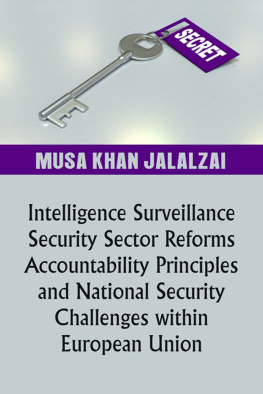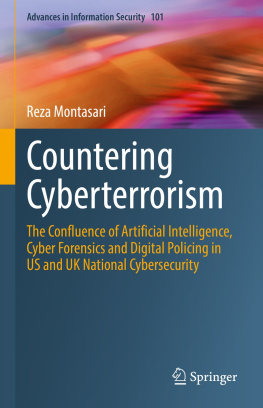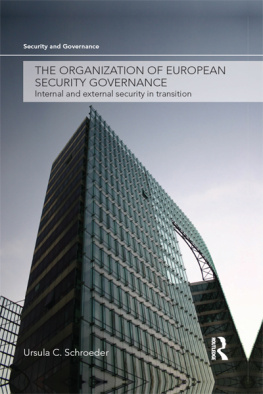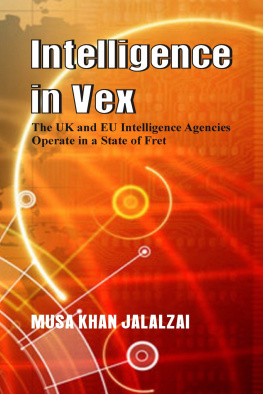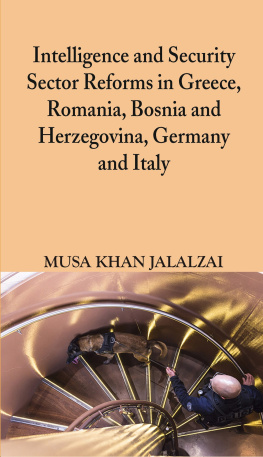Musa Jalalzai - Intelligence Surveillance, Security Sector Reforms, Accountability Principles and National Security Challenges Within European Union
Here you can read online Musa Jalalzai - Intelligence Surveillance, Security Sector Reforms, Accountability Principles and National Security Challenges Within European Union full text of the book (entire story) in english for free. Download pdf and epub, get meaning, cover and reviews about this ebook. year: 2020, publisher: VIJ BOOKS INDIA, genre: Politics. Description of the work, (preface) as well as reviews are available. Best literature library LitArk.com created for fans of good reading and offers a wide selection of genres:
Romance novel
Science fiction
Adventure
Detective
Science
History
Home and family
Prose
Art
Politics
Computer
Non-fiction
Religion
Business
Children
Humor
Choose a favorite category and find really read worthwhile books. Enjoy immersion in the world of imagination, feel the emotions of the characters or learn something new for yourself, make an fascinating discovery.
- Book:Intelligence Surveillance, Security Sector Reforms, Accountability Principles and National Security Challenges Within European Union
- Author:
- Publisher:VIJ BOOKS INDIA
- Genre:
- Year:2020
- Rating:4 / 5
- Favourites:Add to favourites
- Your mark:
- 80
- 1
- 2
- 3
- 4
- 5
Intelligence Surveillance, Security Sector Reforms, Accountability Principles and National Security Challenges Within European Union: summary, description and annotation
We offer to read an annotation, description, summary or preface (depends on what the author of the book "Intelligence Surveillance, Security Sector Reforms, Accountability Principles and National Security Challenges Within European Union" wrote himself). If you haven't found the necessary information about the book — write in the comments, we will try to find it.
Musa Jalalzai: author's other books
Who wrote Intelligence Surveillance, Security Sector Reforms, Accountability Principles and National Security Challenges Within European Union? Find out the surname, the name of the author of the book and a list of all author's works by series.
Intelligence Surveillance, Security Sector Reforms, Accountability Principles and National Security Challenges Within European Union — read online for free the complete book (whole text) full work
Below is the text of the book, divided by pages. System saving the place of the last page read, allows you to conveniently read the book "Intelligence Surveillance, Security Sector Reforms, Accountability Principles and National Security Challenges Within European Union" online for free, without having to search again every time where you left off. Put a bookmark, and you can go to the page where you finished reading at any time.
Font size:
Interval:
Bookmark:
Security Sector Reforms,
Accountability Principles and
National Security Challenges
within European Union
Sector Reforms, Accountability
Principles and National Security
Challenges within European Union

transmitted or utilised in any form or by any means, electronic,
mechanical, photocopying, recording or otherwise, without the prior
permission of the copyright owner. Application for such permission
should be addressed to the publisher.
Font size:
Interval:
Bookmark:
Similar books «Intelligence Surveillance, Security Sector Reforms, Accountability Principles and National Security Challenges Within European Union»
Look at similar books to Intelligence Surveillance, Security Sector Reforms, Accountability Principles and National Security Challenges Within European Union. We have selected literature similar in name and meaning in the hope of providing readers with more options to find new, interesting, not yet read works.
Discussion, reviews of the book Intelligence Surveillance, Security Sector Reforms, Accountability Principles and National Security Challenges Within European Union and just readers' own opinions. Leave your comments, write what you think about the work, its meaning or the main characters. Specify what exactly you liked and what you didn't like, and why you think so.

